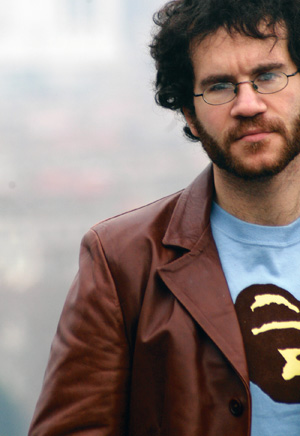What impulse drives people to create? And who chooses such an (often) unappreciated, solitary voyage in the first place?
These are two of the central questions explored over a 12-year period by essayist and author Tom Bissell, whose new nonfiction collection, Magic Hours: Essays on Creators and Creation, highlights a cross-section of writers, artists and filmmakers—from the relatively obscure to the relatively famous—all connected by their ability to produce something from nothing.
A “magic hour” is the cinematic term for brief periods at dawn and dusk that allow for filming and create striking visual effects. Bissell also uses it as an apt descriptor for the somewhat mystical, hard-to-explain process of creation itself. There is much to appreciate in these pieces, not the least of which is the author’s empathy and deep curiosity, along with a willingness to argue anybody down. These aren’t all glowing appreciations—in some cases, they’re the exact opposite—as much as they’re ruminations on why something is relevant, or what makes certain people tick.
In the book’s opener, “Unflowered Aloes,” Bissell argues that classic literature, and its survival, is more arbitrary than one may realize. Much of what is celebrated 100 years after it’s published is happenstance, Bissell writes, oftentimes thanks to a single influential critic, interjecting family member or even (in the case of Moby-Dick) an unlikely discovery in a bookstore’s used bin which, through a series of fortunate events, brought the seafaring novel back into the public eye. Emily Dickinson, Herman Melville and Walt Whitman are presented as a trio of writers who history surely would’ve forgotten without outside interference.
So, what about the aspiring Melvilles out there, those who just need a bit of guidance to create their own timeless classic? Be warned, budding writers, that not every how-to manual you pull off the bookshelf is particularly helpful, Bissell reports.
In a piece called “Writing About Writing About Writing,” Bissell cunningly uses clunky passages of writerly advice against their creators, disputing long-held truths line by line. The simple act of throwing a writer’s words back in his or her face is both potent and hilarious. (This contentious method is also at play in an essay about the Underground Literary Alliance, a group centered on protesting the “professionalization” of writing.)
Bissell doesn’t have a lot of patience for perceived phoniness, cutting down Natalie Goldberg, author of the bestselling Writing Down the Bones, whom he calls a “cunning egomaniac.” Nor does Bissell pull punches when it comes to Anne Lamott’s Bird by Bird, some of which he considers “beneath her readers.” And Bissell even takes Stephen King to task for occasionally pretending to be dumb in his own On Writing. (Bissell doesn’t seem to care too much about burned bridges in the lit community.)
Bissell appears in some of his stories, but generally on the outskirts. Exceptions include an essay about one of his novelist heroes, Jim Harrison, which feels less like a standard profile and more like two old friends catching up. Bissell writes so convincingly about the Michigan-born writer’s talents that you’ll feel a tug to go Harrison-shopping as soon as you finish the piece.
Here, Bissell is using his roots as a jumping-off point—Harrison is an old friend of his father’s and Bissell grew up in Northern Michigan, the desolate, woodsy setting of many of Harrison’s stories—which branches out into a many-splendored reflection on what it means to be a writer today.
Bissell also discusses creation as it pertains to war, examining some of the documentary films that have come out of Iraq and Afghanistan in the last decade, which serve as one of the few real ways to bring some of the horrors of war back home. When it’s justified, as in the case of political writer Robert D. Kaplan, Bissell has no problem calling him an “incompetent thinker and a miserable writer,” before going on to explain why he’s been routinely taken seriously by the likes of President Clinton, and how Kaplan’s writing directly affected foreign policy.
Within Bissell’s bluntness lives a finely tuned ear for comic timing. This isn’t a fluke—he’s also a humor writer. Sometimes, as in the piece about an indie movie filming in his tiny hometown of Escanaba, Mich., he is a man revisiting his past. Other times, a lingering interest in a subject will lead to a meditation on writing, creation and life. And whether he’s examining David Foster Wallace, Two and a Half Men or voice-acting in video games, Bissell (only 37 this year) seems to have a lot of this stuff figured out. He’s had his share of magic hours himself.
Magic Hours: Essays on Creators and Creation
By Tom Bissell
Believer’s Books; $14



